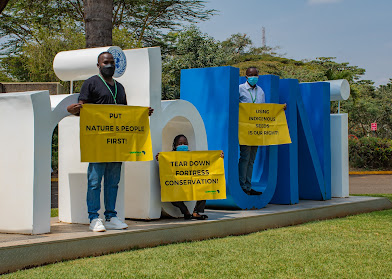Loliondo reflects the urgent need to have a human rights-based approach in the GBF

Photo credits: Greenpeace/Paul Basweti
By International Indigenous Forum on Biodiversity (IIFB)
While we sit in negotiation tables, the IIFB received a message from our brothers and sisters in Tanzania: “On 10th June, our villages in Loliondo were invaded and occupied by military; we were not notified despite the fact that we have a court case coming to its judgment the end of June 2022. We have been shot, harassed, injured-especially women and displaced. Thousands have been displaced including 1,576 children and are now homeless seeking refuge in Kenya. Most of the are lacking basic needs, including food supplies, medical care and accommodation. We are being accused by our government as destroyers of environment; and denied citizenry to Tanzania. Those who crossed to Kenya in fear are now said to be Kenyans. This is the fourth forceful eviction from our land. And our leaders languish in detention in big numbers, 20 of them are charged with murder. We cannot tell the world of the happenings because media is banned from covering our story. The army is erecting the beacons to bisect our only common homeland. The worst anybody could expect in a democratic state like Tanzania.”
So much is at stake in this meeting because biodiversity loss must be halted at all costs. And yet despite the urgency, there is a growing concern that the Global Biodiversity Framework will not be finalized in this meeting as Parties continue to quibble over terminology. It is key to pierce through the veil of semantics and ensure that the objective of 'living in harmony with nature' by 2050 is achieved. The fundamental solution is to defer to the people who have always lived in harmony with nature.
IPLCs are asking for assurance that at the very least, the GBF will include recognition of their rights. The discourse on how the link of indigenous guardianship and biodiversity has long been established by science. It is time to create the mechanism for their full partnership in addressing the biodiversity crisis. There is a formula, and the following must be an integral part of the GBF: Free, Prior and Informed Consent, protection of traditional lands and territories, promoting customary sustainable use, protection of traditional knowledge, access to justice and the rights of environmental human rights defenders.